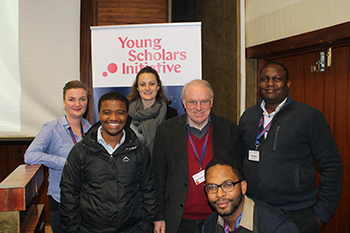
In the first conference of its kind on the African continent,
the Universityof the Free State’s Bloemfontein Campus
was privileged to host the Young Scholars Initiative conference.
Photo: Siobhan Canavan
“It doesn’t matter where a concept originates from if it works. The problem arises when the concept does not work.”
These were the words of Prof Gareth Austin in his address at the Young Scholars Initiative (YSI). His keynote focused on the “Economic History in Africa’s Decolonisation and Development”.
The African economic history
Prof Austin, a professor in Economic History at the University of Cambridge, discussed how African economic history has always been about development, and also gave a brief periodisation of the economic historiography of Africa.
In his closing remarks he focused more on history and economics. “Economics is a sensible approach to take, where history matters because of the sense of context.”
Reflecting on the African experience
A total of 65 young and senior scholars from five continents attended the conference Decolonising Africa? The Economic History of Development, hosted by the YSI in partnership with the International Studies Group at the UFS.
The conference, held from 8 to 9 June 2017, provided an opportunity to reflect on the African experience from an historical perspective and to assess the current position of the continent in the global economy. It discussed new themes in development, such as the role of women, minorities, and entrepreneurs.
The conference focused on how the business community has operated in an Africa that still faces inequalities and unfair terms of trade and lacks a unified political will.